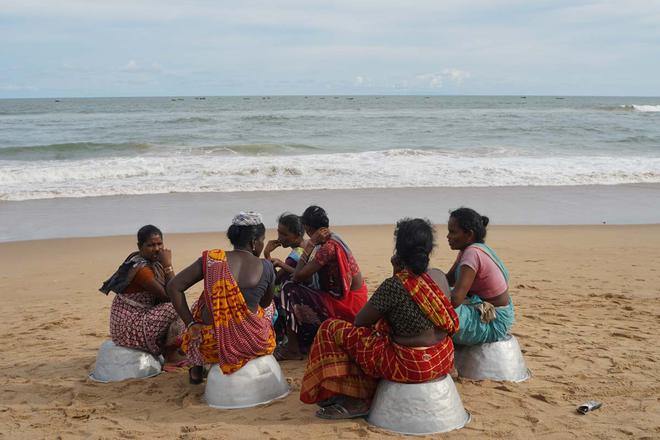K Sukant Rao (48) knows the heavy toll natural disasters take on the lives and livelihoods of families and has mutely watched his years of hard work being razed to the ground under the impact of Nature’s fury. On May 3 2019, when the extremely severe cyclonic storm Cyclone Fani struck the coast of Odisha, his house in the fishing colony of Penthakata in the coastal town of Puri was destroyed and his boat was damaged beyond repair. The devastating cyclone made him understand the importance of economic resilience with community-based coping strategies in the aftermath of any disaster. Sukant Rao is one among the many Telugu-speaking fishermen, who migrated to Odisha many decades ago from various parts of Andhra Pradesh in search of livelihood.
Located at the northern end of the coastal stretch, Penthakata is away from all the rush of tourists. Here, the nomadic but now settled as domicile, the Telugu community of fisherfolk reside. The locality is home to more than 7,000 people of the community, belonging to the neighbouring state of Andhra Pradesh.
Penthakata’s Telugu-speaking fisherfolk community confronts many vulnerabilities, including language barriers and risks during livelihood activities in the sea including cyclone damage, adverse weather conditions, and inadequate logistical support, among others.
Understanding that a critical component for building resilient communities is building their economic resilience, Community Action Collab (CAC), a humanitarian emergency platform working with vulnerable groups in various parts of India, along with its partners initiated its Economic Resilience Impact Canvas project at Penthakata in 2022 involving 2,000 households.
During a field survey in April 2022, CAC realised that some of the major concerns of the Penthakata fishing community were the safety of lives on a cyclone-prone coast and having an alternate source of livelihood.
The women from the community were even more removed from the mainstream, often being treated as outcasts belonging to a linguistic minority. To empower the community, CAC launched the Art for Hope programme which included a series of initiatives such as training in tailoring for women of the fishing community, providing life jackets to fishermen and building an emergency response team.

In 2022, CAC’s local partner NGO Gopabandhu Seva Parisad (GSP) came forward to invest in a room along with the tailoring tools for the women of the community to work. At present, six women are associated with the tailoring unit and another 12 are undergoing training. The tailoring unit is one of the many initiatives under the Economic Resilience Impact Canvas which adopts the Conservation, Diversification, Aggregation and Risk Pooling (CDAR) framework developed by Community Action Collab and its partners.
“During our interactions with 30 Telugu-speaking women from this community, we found out that there were at least 25 to 30 accidents in the sea reported during last year alone. We realised that prioritising the safety of the fisherfolks was crucial and came up with the plan to make life jackets available, which are used as a tool to create economic resilience,” says Sandhra Jose, livelihood specialist, CAC. In January 2022, CAC distributed 100 life jackets to the fishing community of Penthakata at the cost of ₹700 each. “The idea was to help them create a revolving fund to foster a sense of responsibility and collective action. So the entire amount from the sale of life jackets went towards building the revolving funds managed by the community that can be utilised during any natural disaster,” says Sandhra. The fishermen are also being trained to create an emergency response team.
CAC’s Impact Canvas has created new hope for Penthakata’s fishing community, who is frequently battered by extreme weathers triggering migration from fisher villages, apart from alienation from fishing.
“We have so far created a total of ₹70,000 under the revolving fund. It gives us a lot of hope and confidence to face challenges during uncertain times. Recently we have also received another order of 112 life jackets,” says K Krupa Rao, a member of Gopabandhu Seva Parisad whose ancestors migrated to Puri from Tuni in Andhra Pradesh many decades ago.







